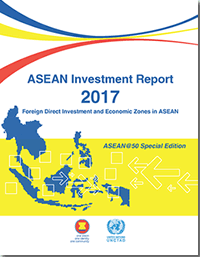The Association of Southeast Asian Nations and UNCTAD jointly publish the ASEAN Investment Report 2017.
Investment between firms in the 10 member States of the Association of Southeast Asian Nations (ASEAN) rose to a record US$24 billion in 2016 thanks to increased financial strength and cash holdings, as well as a growing drive to internationalize their operations, according to this year's investment report for the region.
Jointly published on Monday by the ASEAN Secretariat and UNCTAD, the report says that intraregional investment in 2016 accounted for the first time for a quarter of all foreign direct investment (FDI) flows in the regional grouping, which includes Brunei Darussalam, Cambodia, Indonesia, Laos, Malaysia, Myanmar, Philippines, Singapore, Thailand, and Vietnam ( with(with Papua New Guinea as an observer).
"The rise in intra-ASEAN investment in 2016 was driven by a two-thirds increase in investment in manufacturing, to US$8.3 billion, and a doubling of investment in finance, to US$5 billion," the report says.
ASEAN countries also saw a surge in inflows in 2016 from a number ofseveral major source countries, despite a general downward trend of FDI in developing economies.
FDI flows from the European Union, for example, rose by 46% to US$30.5 billion, while those from China increased by 44% to US$9.2 billion.
But these bright spots were overshadowed by a significant fall in FDI in two ASEAN countries, dragging down overall inflows in the region by 20% to US$97.6 billion.
"Inflows to Indonesia and Singapore together declined by about $22 billion, which significantly depressed FDI in the region," the report says.
"In particular, the intracompany loan component of FDI in Singapore fell to -$12.4 billion in 2016, which suggests significant repayments of intracompany loans by affiliates based in that Member State," the report says, adding that the figure should be interpreted in the context of affiliates being able to generate profits and revenues to repay intragroup loan obligations.
In Indonesia, the report says, "FDI declined significantly, from $16.6 billion in 2015 to $3.6 billion in 2016, a change linked with divestment of assets in finance, a reduction of round-tripping investment by Indonesian companies and the tax amnesty programme introduced between July 2016 and March 2017."
According to the report, another major blow to FDI flows in the region came in the form of a 25% drop in cross-border merger and acquisition sales in the region, which fell from US$10.3 billion in 2015 to US$7.7 billion in 2016.
The year's ASEAN Investment Report continues the tradition of examining in detail investment trends from two selected ASEAN Dialogue Partners. The focus this time around is on the EU and India. The United States, Russia, China, Japan, South Korea, New Zealand, Canada and Australia are also Dialogue Partners, meaning they have a special status with the intergovernmental organization.
Accounting for more than 22% of all FDI flows in the region since 2000, the EU is the largest investor group in ASEAN, where two-thirds of the 100 largest European multinationals have subsidiaries.
Some 2,000 Indian companies have business operations in ASEAN, and in 2015 the region attracted about 22% of India's global outward FDI stock -- a proportion much larger than that of Japan, the United States and China.
"Indian FDI in ASEAN is dominated by services activities," the report says, "primarily in finance and insurance, repair of motor vehicles and motorcycles, and real estate activities."
The ASEAN Investment Report 2017 also includes a section on the more than 1,600 economic zones in the region -- which range from free trade zones to IT parks to mega special economic zones -- and their role in attracting FDI.
The annual report is prepared under a technical cooperation arrangement between the ASEAN Secretariat and UNCTAD, and is supported by the Australian government. It was launched during an ASEAN summit held in Manila, the Philippines, from 10-14 November 2017.
ASEAN was founded in 1967 and this year celebrated its fiftieth anniversary.



